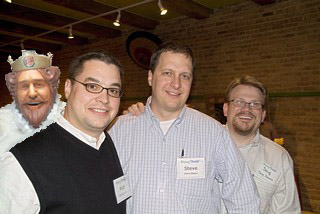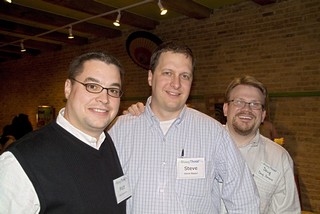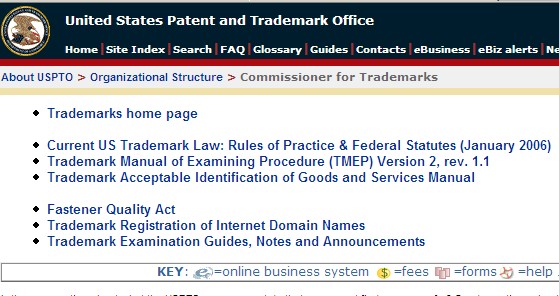Are you a Blawgr? Wanna be?
Posted by Stephen M. Nipper at February 27, 2006 02:18 AM
 Last week Rethink(IP) went public with our latest work. A collaboration with Tech Law Advisor blog's Kevin Heller. Called "Blawgr," it is our attempt at a legal community weblog. This blog, which itself is a collaboration between the writers of the Promote the Progress blog, PHOSITA blog and The Invent Blog has left us passionate about one thing: working with other attorneys to create a a larger and larger legal community.
Last week Rethink(IP) went public with our latest work. A collaboration with Tech Law Advisor blog's Kevin Heller. Called "Blawgr," it is our attempt at a legal community weblog. This blog, which itself is a collaboration between the writers of the Promote the Progress blog, PHOSITA blog and The Invent Blog has left us passionate about one thing: working with other attorneys to create a a larger and larger legal community.
Blawgr is one piece in that puzzle...a community weblog.
What is a community weblog?
It is a weblog where we'll be turning the keys over to YOU...our readers, our peers, our fellow blawgers/law bloggers, our friends. YOU can sign up for an account and make posts and/or comments. As the picture (of my 4 year old Joshua) screams...SAY WHAT??? Yes, I'm sure many of you are thinking "are they nuts??" Maybe. Time will tell.
We're pretty convinced that we are onto something. In the meantime, we hope you will (1) stop by and check Blawgr out and (2) keep an eye on us.
USPTO Releases Update to Private Pair
Posted by Stephen M. Nipper at February 23, 2006 03:12 PM
In case you missed it...we posted on the New Private Pair that was released by the USPTO earlier today over at RSSMojo. It is worth reading.
RSSMojo is a Rethink(IP) site where we post important USPTO News & Notices and information on recent patent lawsuit filing.
USPTO.gov suggestion: zip the TMEP
The MPEP is provided zipped up in three nice "chunks"...ready for easy downloading. http://www.uspto.gov/web/offices/pac/mpep/index.html
The TMBP is provided in a zipped format too. http://www.uspto.gov/web/offices/dcom/ttab/tbmp/
However, the TMEP isn't provided like that. If you want a local copy of the TMEP you have to download each chapter one at a time. Argh. http://www.uspto.gov/web/offices/tac/tmep/
Suggestion...provide the TMEP in one or more zipped files.
Praise: All appear to be saved in a PDF format with OCR (thus, you can load them into Acrobat/Acrobat Reader and do a text search within them...or, as the post at the EsqGear legal tech blog pointed out this morning you can have a desktop search program (X1, Google Desktop, Copernic, etc.) index it and have the ability to search the MPEP/TMEP/TBMP from your desktop on the fly. Very cool).
One benefit of doing this is that by encouraging users to download local copies...less bandwidth in downloading the same chapters over and over again each time you need it.
We've got the King
Posted by J Matthew Buchanan at February 20, 2006 11:14 PM
 Dennis Kennedy is the undisputed King of Legal Technology. He’s a big thinker, a visionary and an overall good guy (he even agreed to don the BK costume at the recent BlawgThink 2005 event in Chicago to pose for this great picture).
Dennis Kennedy is the undisputed King of Legal Technology. He’s a big thinker, a visionary and an overall good guy (he even agreed to don the BK costume at the recent BlawgThink 2005 event in Chicago to pose for this great picture).
Over the last year or so, the three of us have had the opportunity to collaborate with Dennis on various projects. We’ve had a lot of fun (just look at the picture!) and always look forward to our next project with the King.
Soon we’ll be having a roundtable discussion with Dennis about legal blogging. We’re planning on talking about such hot topics as blog experimentation, things we’ve learned, and things we’d do differently if we were starting today. We’re going to record the discussion and post it as a podcast on the rethink(ip) blog…so stay tuned.
For a primer on some of the issues we’ll tackle, visit Steve’s excellent post on things he’d do differently, and Dennis’ excellent follow-up post.
The Patent Posse
Posted by Douglas Sorocco at February 17, 2006 10:54 PM
 I have been playing around with some of my photos from last fall and ran across this one that I have been a bit remiss in putting up.
I have been playing around with some of my photos from last fall and ran across this one that I have been a bit remiss in putting up.
Yes, there are actually three of us – and we can show up in the same place at the same time. This is an image of us (Matt, Steve and Doug – left to right) at BlawgThink last November. Hobie Swan from MindJet took the photo – so it is his skills showing through in the image.
Now hopefully all our crazy fans will be able to sleep at night!
Annoying EPO Practice: Form 1205A
Yesterday I received a phone call from a client who had just received a registered letter from the European Patent Office entitled "Noting of loss of rights pursuant to Rule 69(1) EPC." The letter went on to state that his "European patent application...is deemed to be withdrawn" for failing to pay the appropriate fees. He called me worried that I had somehow screwed up his application (the ONLY country he filed his PCT application in was Japan).
After not finding the answer using my Google-fu, I had my secretary call the EPO this morning. The answer she received on the phone: "this is a standard procedure of the European Patent Office. It is just to let the applicant know that they missed the deadline to file in Europe."
This whole thing annoyed me for a number of reasons: (1) it was sent by registered mail not to me but to my client; (2) it is misleading in that the client never had a European patent application; (3) I had to spend time which I didn't feel was billable to the client explaining to the client that the European Patent Office just does things like that; and (4) I'm not sure the purpose of the letter, other than reminding applicants that if they wanted to they could pay extension fees to still file (fishing????).
Is there a reason for any of this I don't understand? Please clue me in.
Things We Hate...time for a name change?
Posted by Stephen M. Nipper at February 13, 2006 05:08 PM
Is it just me, or is the "things we hate" title quite hateful? I didn't really intend it to come out that way. It was originally intended as a way for us to list things we wished were different about the www.uspto.gov website. Suggestions. Improvements. Comments.
But yet it has that awful HATE tag.
What do you think? Should we retitle the series to not be so negative? Retire the "hate?"
Things We Hate About the USPTO.GOV Website: Who is the Current Commissioner for Trademarks?
Trivia question: Who is the current Commissioner for Trademarks?
Shouldn't the answer be on the USPTO's "Commissioner for Trademarks" page?
It isn't:

The correct answer is: Lynne G. Beresford.
At least the Commissioner of Patents page lists John Doll as the current Commissioner.
Our previous "Things we hate about the USPTO.gov website": http://www.rethinkip.com/archives/hate_usptogov/
Public domain music via "donum mundus" clauses
Posted by Stephen M. Nipper at February 9, 2006 09:21 PM

What an “amusing” concept…reserving the right to donate to the public domain.
I’m not sure I’ve ever seen this before. My surfing the other night brought me across the blog of a musical artist (Chris Rice). [Disclaimer: I'm a fan of his.]
In one post, Chris talks about how in negotiating his latest record deal he demanded that a “donum mundus” clause (“gift to the world”) be put into his recording contract. The clause allows him to, outside of his exclusive contract with his recording label, create works which he can donate to the public domain. Why? Because according to Chris, “[s]omehow in the [illegal file sharing/copyright] debate, we have forgotten that music exists primarily to beautify the world, and that, although important, earning a living from it is secondary.”
I’m not sure which is more amazing. The idea (reserving the right to donate his talents), or the fact that his recording label agreed to let him do it. Personally, I would foresee that the record label would want to sign off of what songs are kept and which are donated…but that isn’t what happened here.
It will be interesting to see if Chris’ idea catches on…I’ll be keeping an eye on his blog, interested in seeing what the clause actually looks like.
Return of the Prodigal Son...PatentMojo.com comes home

A long time ago, in a galaxy far far away....
Rethink(IP) owned a website called PatentMojo. PatentMojo was beautiful. It was built in Ruby and allowed you to set up RSS feeds of USPTO patent searches. And then it died...causing much gnashing of teeth. Not only did the site die, but we didn't even have access to the domain name to fix it. Argh. Leave it to three IP attorneys to not get the appropriate copyright assignments in place and copies of the source code. Lesson learned. ;)
Well...I'm pleased to announce that it's back. Sort of. We were able to obtain the domain name, but the code is gone gone gone.
So...if you know of anyone (programmer) who would be interested in helping us get our patent search to RSS site back up and going...please let us know. We'd love to talk with them.
Rethinking Trademark Law
Interesting thoughts via the INTA list yesterday (reposted here with author's permission):
Certain principles of trademark law seem at odds with each other. And no amount of judicial or legislative tinkering is able to properly account for their differences.If we could start over and implement a new legal regime might we:
1. Take the public interest out of trademark law. Let local, regional or national consumer protection laws and regulations deal with consumer confusion. Then the private ordering of rights could be based solely on
rules of property- with dilution as the touchstone for measuring the rights associated with verbal and non verbal symbols.2. Unchain the protection of brands from ongoing business goodwill. Let the law more easily recognize the value- if any- inherent in the symbols.
3. Bite the bullet and go to a first to file system
Dick Troll
Woodard, Emhardt, Moriarty, McNett & Henry LLP
Your thoughts?
Intellectual Property Anti-Matter
Posted by Bill Meade at February 3, 2006 11:47 AM
Last March I gave an invention workshop at Michigan State University in East Lansing Michigan. MSU is my alma mater, so the session was a lot of fun because one of my graduate school mentors hosted the session, provided pizza (!), and compelled attendence by his current graduate students.
While I was reviewing the forms and functions of intellectual property, the faces of the graduate students went from interested to appalled. After the subject of licensing came up, one of the graduate students could not contain himself any longer. He raised his hand and said:
"Michigan State is a land grant school. The whole idea of the land grant school is to produce science and technology that is useful for farmers. I don't want my research patented if that means that growers won't be able to use it."
This sparked a lively discussion where we explored using intellectual property in creative ways to advance what I'll call the "land grant ethic." The most interesting idea in the discussion was "intellectual property anti-matter."
The requirements of masters and Ph.D. theses go pretty far towards establishing that the thesis written is new to the world science or technology. At least, the goal is to have an authentic creative contribution in the thesis.
Imagine if after the thesis is completed, that the graduate student sat down with a patent attorney and worked through the thesis to translate research results into patent claims. Several patents would be likely to be captured by this process. Now, imagine that the patent applications written by the patent attorney are published as defensive publications. What do you call the result?
Answer: Intellectual Property Anti-Matter.
The building blocks of conventional intellectual property management can be recombined in many more ways than they are used conventionally. New combinations of IP building blocks may be useful to open source, free software, and creative commons type communities.
For example, ...
The linux community has been engaged in a huge game of catch up to date. The functionalities of commercial operating systems have been re-written from scratch to avoid copyright infringements. Imagine a world in which Linux has finally caught up to proprietary operating systems technologically. In such a world, development of Linux shifts to pushing the envelope of new-to-the-world functionality. If after completing the technology the Linux developers could sit down with patent attorneys and draft patents on the new-to-the-world functionality, and then publish the applications as defensive publications, they can destroy patentability of the new-to-the-world functionalities ... even for proprietary operating systems companies.
Community newtorking people who are on the ground making mesh networks work will discover improvements needed to the technology to make it practical. If after discovering improvements, the mesh network people could defensively publish the improvements, they can open up key aspects of the intellectual property around these evolving technologies.
The big so what of this is that if a community wanted to organize to manage the threats of external patenting to their future, they can employ intellectual property anti-matter to do so. They will only be able to capture new to the world technologies. But, a concerted IP management effort would, in 17 years, be able to open up a considerable amount of design freedom world wide.
Just a thought.
bill meade
www.basicip.com
[Bill's previous post on THE 6 LIFE STAGES OF INVENTORS is here.]
[Bill's previous post on PROACTIVE INVENTION MANAGEMENT is here.]



 J. Matthew Buchanan
J. Matthew Buchanan  Stephen M. Nipper
Stephen M. Nipper  Douglas Sorocco
Douglas Sorocco 